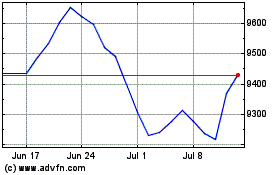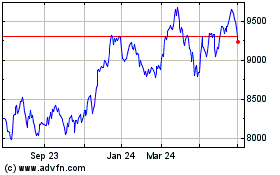Hong Kong Stock Exchange Drops Nearly $37 Billion Bid for London Rival -- 2nd Update
October 08 2019 - 5:47AM
Dow Jones News
By Steven Russolillo and Ben Dummett
Hong Kong's stock exchange pulled a $36.6 billion bid for its
London rival, a deal that would have united two major trading hubs
even as both are clouded in political turmoil.
Less than a month after it first unveiled the surprise proposal,
Hong Kong Exchanges & Clearing Ltd. said it couldn't pursue a
takeover of London Stock Exchange Group PLC without any input from
LSE's management. The target's board had quickly rejected the
approach.
The Hong Kong company had hoped a tie-up would solidify its role
as a gateway for the flow of capital between mainland China and
Western markets. But it said in a statement Tuesday that it was now
"not in the best interests of HKEX shareholders to pursue this
proposal."
Hong Kong is reeling from months of protests over concerns about
China's encroachment on the semiautonomous city. Over the weekend,
the Hong Kong's government invoked emergency powers for the first
time in half a century in an attempt to quell the unrest. When LSE
rejected HKEX's offer last month, it questioned Hong Kong's future
as a financial gateway to China.
Britain, meanwhile, is negotiating a messy divorce from the
European Union.
In walking away from the deal, HKEX clears the way for LSE to
conclude its own $14.5 billion plan to acquire
financial-information and terminal company Refinitiv Holdings Ltd.
from a Blackstone Group Inc.-led group. The Hong Kong group's bid
was contingent on its London rival scrapping that transaction. In a
statement Tuesday, the LSE said the Refinitiv deal remains on track
to close in the second half of 2020.
Two days after HKEX publicly released its proposal on Sept. 11,
the LSE rejected the offer. It said the Refinitiv deal made more
strategic sense and would face a less challenging regulatory
review. LSE and rivals are increasingly focusing on selling
financial data to help counteract the pressure on fees from
stock-trading services and other more mature businesses.
HKEX had sought to create an Asian-European exchange giant
offering trading, clearing, settlement, data and risk-management
services spanning different asset classes, time zones and
continents.
In a blog post on Tuesday, HKEX Chief Executive Charles Li said
the "vision for the business looking forward is to build upon the
role we already play in Hong Kong, China, Asia and more widely."
HKEX declined to make Mr. Li available for further comment.
Shares of HKEX closed 2.3% higher on Tuesday. The stock had
dropped 8.2% from when the proposal was first made public through
the close of trading Friday. The deal was worth $36.6 billion at
announcement, and about $34.4 billion based on HKEX's closing share
price Friday and recent exchange rates. Financial markets in Hong
Kong were closed for a public holiday Monday.
LSE shares dropped more than 6% after the bid was rescinded. Yet
the stock remains up more than 70% for the year, with the bulk of
those gains following the Refinitiv deal announcement.
Chinese acquisitions of foreign companies face growing scrutiny
from the Committee on Foreign Investment in the U.S., the U.K., and
other Western governments worried that Beijing could gain access to
sensitive data and financial information.
HKEX had tried to address some of these concerns, noting its
ownership since 2012 of the London Metal Exchange. It said the
primary regulators of LSE's trading, clearing, data and other
operations would continue to oversee those businesses, and the
merged group would maintain a secondary listing in London.
The Hong Kong group could have launched a formal hostile offer,
taking its proposal directly to LSE shareholders. But that would
have been an uphill battle without obvious support for the deal
from HKEX's own shareholders and given the market's positive
reaction to the LSE-Refinitiv tie-up.
Larry Tabb, founder and research chairman of the financial
markets research and advisory firm Tabb Group, said it wasn't
surprising that HKEX pulled the offer, particularly with the
Refinitiv bid already on the table. "It would have been a herculean
effort to get it across the line," he said.
The London Stock Exchange has been involved in a string of
attempted mergers and takeovers over the past two decades. It is
wary of cross-border exchange deals after failing in 2011 to merge
with Canada's TMX Group Ltd. and then in 2017 to join forces with
Germany's Deutsche Börse AG.
Quentin Webb contributed to this article.
Write to Steven Russolillo at steven.russolillo@wsj.com and Ben
Dummett at ben.dummett@wsj.com
(END) Dow Jones Newswires
October 08, 2019 05:32 ET (09:32 GMT)
Copyright (c) 2019 Dow Jones & Company, Inc.
London Stock Exchange (LSE:LSEG)
Historical Stock Chart
From Mar 2024 to Apr 2024

London Stock Exchange (LSE:LSEG)
Historical Stock Chart
From Apr 2023 to Apr 2024
